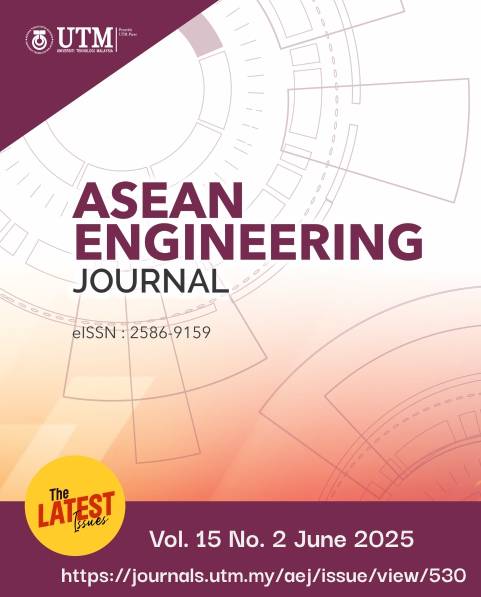A VT-INSENSITIVE CRYSTAL-LESS CMOS RELAXATION OSCILLATOR WITH MOS PROCESS COMPENSATION in 0.18 µm TECHNOLOGY
DOI:
https://doi.org/10.11113/aej.v15.21621Keywords:
Current reference, crystal-less oscillator, MOS-process compensation, temperature coefficient, voltage-temperature insensitiveAbstract
An on-chip crystal-less relaxation oscillator is presented in this work. It exhibits a self-biased current reference to reduce the overall supply voltage sensitivity in which the input current is made to directly depend on the output current of the current source itself instead of having an input current connected directly to the supply voltage. The temperature compensation is achieved from bipolar bandgap topology in order to take advantage of summing the proportional-to-absolute-temperature (PTAT) current and the complementary-to-absolute-temperature (CTAT) current. Through carefully sized output transistors, a drain current IREF is generated to charge and discharge the oscillating capacitor. This design demonstrates a simple compensation technique that achieves a frequency variation of less than ±1% with a supply voltage of 1.8V input at normal temperature. A linear regulation performance achieves less than ±1% over supply voltage that ranges from 1.62V to 1.98V. A temperature coefficient less than 200ppm/°C is achieved over the temperature range of -10 to 120°C. The whole chip occupies 0.57mm2 (753.3 μm x 753.3 μm) and consumes 700 μW. This oscillator has been designed and analyzed with 0.18μm 1p6m TSMC CMOS process, intended to serve as a clock generator of power electronic systems to improve worst-case power efficiency.
References
De Vita, G., Marraccini, F. and Iannaccone, G. 2007. Low-Voltage Low-Power CMOS Oscillator with Low Temperature and Process Sensitivity. In IEEE International Symposium on Circuits and Systems. 2152-2155. DOI: https://doi.org/10.1109/ISCAS.2007.378599
Sundaresan, K., Allen, P. E., and Ayazi, F. 2005. Process and temperature compensation in a 7-MHz CMOS clock oscillator. In IEEE Journal of Solid-State Circuits, 41(2): 433-442. DOI: https://DOI.org/10.1109/JSSC.2005.863149
Tsai, Y. -K. and Lu, L. -H. 2016. A 51.3-MHz 21.8-ppm/°C CMOS Relaxation Oscillator with Temperature Compensation. In IEEE Transactions on Circuits and Systems II: Express Briefs. 64(5): 490-494. DOI: https:// doi.org/10.1109/TCSII.2016.2581825
Sadeghi, N., Sharif-Bakhtiar, A. and Mirabbasi, S. 2012. A 0.007-mm2 108 ppm/°C 1-MHz Relaxation Oscillator for High-Temperature Applications up to 180 °C in 0.13-µm CMOS. In IEEE Transactions on Circuits and Systems I: Regular Papers. 60(7): 1692-1701. DOI: https:// doi.org/10.1109/TCSI.2012.2226500
Wang, J., Goh, W. L., Liu, X. and Zhou, J. 2016. A 12.77-MHz 31 ppm/°C On-Chip RC Relaxation Oscillator with Digital Compensation Technique. In IEEE Transactions on Circuits and Systems I: Regular Papers. 63(11): 1816-1824. DOI: https:// doi.org/10.1109/TCSI.2016.2593705
Rincon-Mora, G. A. and Allen, P. E. 1998. A low-voltage, low quiescent current, low drop-out regulator. In IEEE Journal of Solid-State Circuits. 33 (1): 36-44. DOI: https:// doi.org /10.1109/4.654935
Bult, K. and Buchwald, A. 1997. An embedded 240-mW 10-b 50-MS/s CMOS ADC in 1-mm/sup 2/. In IEEE Journal of Solid-State Circuits. 32(12): 1887-1895. DOI: https:// doi.org/10.1109/4.643647.
Huang, H.Y., Chiu, W. M., Lin, W. M. 2004. Pulsewidth control loop circuit using combined charge pumps and miller scheme," In Proceedings of 2004 Solid-State and Integrated Circuits Technology Conference. 2: 539-1542. DOI: https:// doi.org/10.1109/ICSICT.2004.1436907.
Paidimarri, A., Griffith, D., Wang, A., Burra, G. and Chandrakasan, A. P. 2016. An RC Oscillator with Comparator Offset Cancellation. In IEEE Journal of Solid-State Circuits. 51(8): 1866-1877.DOI: https:// doi.org/10.1109/JSSC.2016.2559508
Denier, U. 2010. Analysis and Design of an Ultralow-Power CMOS Relaxation Oscillator. IEEE Transactions on Circuits and Systems I: Regular Papers. 57(8): 1973-1982. DOI: https://doi.org/10.1109/TCSI.2010.2041504
Chen, R., Zhang, Y. and Zhan, C. 2022. A 120nW, 121 kHz, -20~100°C CMOS Relaxation Oscillator with Digital Current Comparator and On-Chip Voltage and Current Reference. In IEEE International Conference on Integrated Circuits, Technologies and Applications (ICTA). 34-35. DOI: https://doi.org/10.1109/ICTA56932.2022.9963069
Truesdell, D. S., Dissanayake, A. and Calhoun, B. H. 2019. A 0.6-V 44.6-fJ/Cycle Energy-Optimized Frequency-Locked Loop in 65-nm CMOS with 20.3-ppm/°C Stability. IEEE Solid-State Circuits Letters. 2(10): 223-226. DOI: https://doi.org/10.1109/LSSC.2019.2946767
Razavi, B. 2001. Design of Analog CMOS Integrated Circuits. McGraw-Hill Education (Asia) Co. and Xian Jiaotong University Press.
Leelarasmee, E., 2011. A CMOS Current Controlled Ring Oscillator with Wide and Linear Tuning Range. ASEAN Engineering Journal, 1(2): 5-10. DOI: https://doi.org/10.11113/aej.v1.15286
Cimbili, B., Wang, D., Zhang, R. C., Tan, X. L. and Chan, P. K. 2016. A PVT-tolerant relaxation oscillator in 65nm CMOS. In IEEE Region 10 Conference (TENCON). 2315-2318. DOI: https:// doi.org/10.1109/TENCON.2016.7848442
Xu, Z., Wang, W., Ning, N., Lim, W. M., Liu, Y. and Yu, Q. 2014. A Supply Voltage and Temperature Variation-Tolerant Relaxation Oscillator for Biomedical Systems Based on Dynamic Threshold and Switched Resistors. In IEEE Transactions on Very Large Scale Integration (VLSI) Systems. 23(4): 786-790. DOI: https://doi.org/10.1109/TVLSI.2014.2317722
Chang, Y. -A. and Liu, S. -I. 2019. A 13.4-MHz Relaxation Oscillator with Temperature Compensation. In IEEE Transactions on Very Large Scale Integration (VLSI) Systems. 27(7): 1725-1729. DOI: https://doi.org/10.1109/TVLSI.2019.2908204
Sinha, R., Rajagopal, D. and Khare, N. 2023. A Temperature Compensated Voltage Controlled Relaxation Oscillator for Frequency Modulated DC-DC Charge Pump Regulation. In IEEE Transactions on Circuits and Systems II: Express Briefs. 70(8): 2764-2768. DOI: https://doi.org/10.1109/TCSII.2023.3247632
Toledo, P., Klimach, H., Cordova, D., Bampi, S. and Fabris, E. 2014. Self-biased CMOS current reference based on the ZTC operation condition. In Symposium on Integrated Circuits and Systems Design (SBCCI). 1-7. DOI: https://doi.org/10.1145/2660540.2660990
Wu, W., Zhiping, W. and Yongxue, Z. 2007. An Improved CMOS Bandgap Reference with Self-biased Cascoded Current Mirrors. In IEEE Conference on Electron Devices and Solid-State Circuits. 945-948. DOI: https://doi.org/10.1109/EDSSC.2007.4450282
Tokunaga, Y., Sakiyama, S., Matsumoto, A. and Dosho, S. 2010. An On-Chip CMOS Relaxation Oscillator with Voltage Averaging Feedback. In IEEE Journal of Solid-State Circuits. 45(6): 1150-1158. DOI: https://doiI.org/10.1109/JSSC.2010.2048732
Mikulić, J., Schatzberger, G. and Barić, A. 2017. A 1-MHz on-chip relaxation oscillator with comparator delay cancellation. In 43rd IEEE European Solid State Circuits Conference (ESSCIRC). 95-98. DOI: https://doi.org/1010.1109/ESSCIRC.2017.8094534
Abbasizadeh, H., Samadpoor Rikan, B. and Lee, K. -Y. 2015. A fully on-chip 25MHz PVT-compensation CMOS Relaxation Oscillator. In International Conference on Very Large Scale Integration (VLSI-SoC). 241-245. DOI: https://doi.org/10.1109/VLSI-SoC.2015.7314423
















